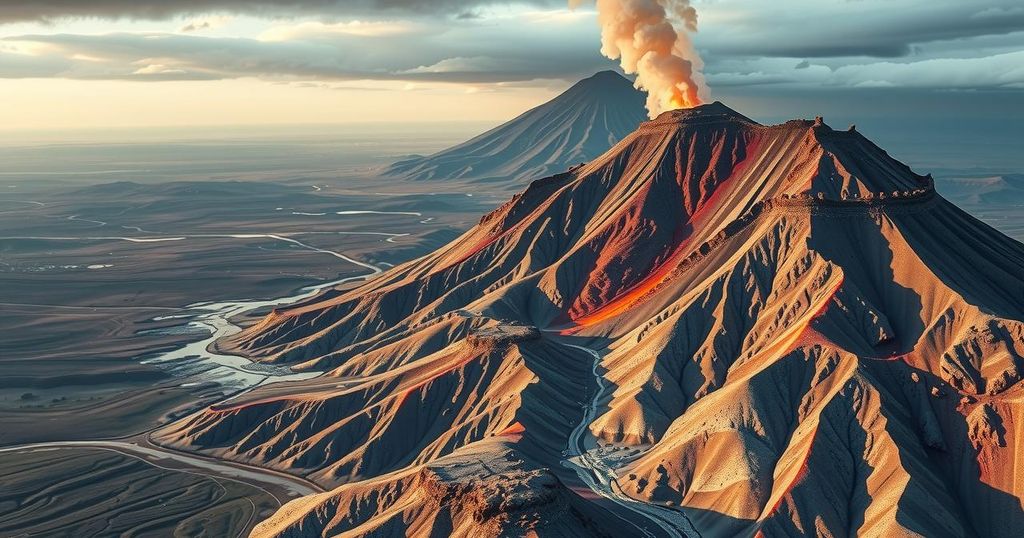World news
ABBAS SHERAQI, ABOMSA, AFRA, AFRICA, AP, BBC, CAIRO UNIVERSITY, CLIMATE, CLIMATE CHANGE, EARTHQUAKES, EGYPT, EGYPTIAN GEO, ETHIOPIA, ETHIOPIA GEOLOGICAL INSTITUTE, ETHIOPIAN GEOLOGICAL INSTITUTE, FENTALE, FLOODING, NATURAL DISASTERS, RENAISSANCE DAM, SHERAQI, US GEOLOGICAL SURVEY, USGS
Marcus Chen
0 Comments
Magnitude-5.8 Earthquake and Volcanic Eruption Strike Ethiopia, Prompt Evacuations
On January 4, 2025, a magnitude-5.8 earthquake occurred in Ethiopia, nearby Addis Ababa, prompting evacuations as Mount Dofan erupted. Experts warn of increased seismic activity and its potential impact on the Grand Ethiopian Renaissance Dam, amidst ongoing disputes involving Egypt and Sudan over water rights.
On January 4, 2025, a magnitude-5.8 earthquake struck the Ethiopian regions of Abomsa and Amhara, close to the capital city, Addis Ababa. The earthquake’s epicenter was recorded at a depth of 10 kilometers, as confirmed by the Ethiopian Geological Institute and the United States Geological Survey (USGS). In light of the situation, geological experts have raised concerns that the seismic activity may escalate further, posing potential dangers to local communities. In conjunction with these seismic events, Mount Dofan Volcano in the Afar region erupted, prompting officials to recommend the evacuation of thousands of residents to temporary shelters.
Ethiopian authorities, aware of the significant implications of these geological events, are monitoring the developments closely. According to Abbas Sheraqi, an Egyptian geologist from Cairo University, the intensified seismic activity could be indicative of further geological disturbances. He emphasized the risks associated with volcanic activity possibly affecting other nearby volcanoes. Sheraqi expressed concerns regarding the stability of the Grand Ethiopian Renaissance Dam (GERD), stating, “We do not wish for the Renaissance Dam to collapse, as our brothers in Ethiopia live safely far from the dam. However, our concern is for our brothers in Sudan, as well as the fact that the waters of the Renaissance Dam [GERD] serve as an important water reserve for Egypt.”
This situation unfolds against the backdrop of a protracted diplomatic impasse between Egypt, Sudan, and Ethiopia over the GERD. Despite a decade of negotiations aimed at establishing a binding agreement to safeguard the water rights of all parties, substantive progress has remained elusive. Egypt recently cited Ethiopia’s unwillingness to engage in mutually acceptable technical or legal solutions as a major cause for the stalemate. The recent seismic events in the region underscore the urgent need for continued dialogue and cooperation among the involved nations in addressing concerns not only related to water security but also geological risks affecting regional stability.
Ethiopia has been experiencing increased seismic activity, raising concerns regarding potential geological hazards that could affect both the population and critical infrastructure within the region. The Grand Ethiopian Renaissance Dam, which has been a focal point of contention between Ethiopia, Egypt, and Sudan for over a decade, is located near potential volcanic activity sites. Recent events illustrate the complex interplay between natural disasters and geopolitical tensions, notably in terms of water resource management and environmental safety.
The January 4, 2025, earthquake and subsequent volcanic activity in Ethiopia signal critical concerns for local residents and the surrounding countries, particularly Egypt and Sudan. These developments highlight the intricate relationship between geological phenomena and international diplomatic relations concerning water rights. The need for effective communication and cooperation among these nations is paramount to address both environmental safety and shared water resources amidst ongoing disputes over the Grand Ethiopian Renaissance Dam.
Original Source: www.egypttoday.com




Post Comment